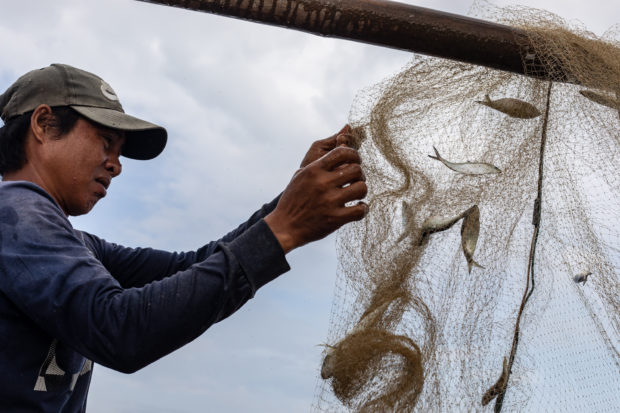Fishers contradict LGUs’ claim that Manila Bay is ‘dead’

Pablo Bueno Jr. inspects their catch for the day. Fishing communities in Manila Bay have experienced a decline in catching fish and other marine resources due to seabed quarrying and reclamation projects.
MANILA, Philippines — Militant fishers’ group Pambansang Lakas ng Kilusang Mamamalakaya ng Pilipinas (Pamalakaya) on Friday contradicted the claim of local government units (LGUs) that Manila Bay is already a “dead” body of water.
“Taliwas sa sinasabi ng mga LGU, sagana pa sa iba’t-ibang klaseng yamang-dagat ang Manila Bay. Katunayan, signipikanteng bilang pa ng mangingisda mula Cavite, Metro Manila, Bulacan, at Bataan ang umaasa sa pangisdaan nito,” Fernando Hicap, national chairperson of Pamalakaya, said in statement.
(Contrary to the claims of local officials, Manila Bay is still diverse with marine resources. In fact, a significant fishing population from Cavite, Metro Manila, Bulacan, and Bataan rely on its fishing grounds.)
Coral covers have been discovered in the southern part of Manila Bay, specifically in the province of Cavite which is home to 72% of the coral reefs in Manila Bay, Hicap said, citing a report of the Department of Environment and Natural Resources (DENR) Ecosystems Research and Development Bureau.
He, however, noted that the bay is at risk for total damage.
Article continues after this advertisement“Subalit totoong nanganganib na tuluyang masira ang mga ito dahil sa malawakang reklamasyon na kasalukuyang isinasagawa at nakaamba sa Manila Bay,” the fisherfolk chairperson added.
Article continues after this advertisement(But it is true that these abundant marine resources are threatened by massive reclamation projects ongoing and pending in Manila Bay.)
According to Hicap, at least 30 projects are listed in Manila Bay. Out of these, 21 have acquired DENR’s environmental compliance certificates.
Pamalakaya recalled that he sought help from DENR Secretary Maria Antonia Yulo-Loyzaga, but received none.
The group urged local governments to join them in calling on government agencies to stop destructive reclamation and begin genuine rehabilitation.
Last year, senators castigated the agency for approving 21 planned reclamation projects in Manila Bay, despite the potential environmental damage they could cause. — Niña Cuasay, trainee